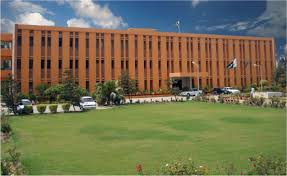- Advertisement -
HYDERABAD, Feb 24 (APP):The national and foreign experts have underlined the urgent need to promote arid agriculture in Sindh over the next 4 decades because about half of the province’s land remains uncultivated due to its arid nature.
The recommendation surfaced at the second “International Conference on Medicinal Plants and Grazing Resources-2025” at the Sindh Agriculture University’s (SAU) Umerkot Campus, according to a press statement issued here on Monday.
The event was organized by SAU Umerkot Campus in collaboration with the Higher Education Commission (HEC), Islamabad, Hamdard University, Karachi, and the Food and Agriculture Organization (FAO) of the United Nations.
The experts also highlighted the importance of focusing on the cultivation, research, processing, and marketing of medicinal plants in Thar.
The key proposals included the establishment of the Thar Development Authority, Thar University, business and tourism initiatives at the Khokhrapar Border, and a Center of Excellence for Research in Thar to harness the region’s agricultural potential.
Speaking at the conference SAU’s Vice Chancellor Dr Altaf Ali Siyal stated that Thar was the 17th largest desert globally and covered 33 percent of Sindh’s land besides holding significant potential for medicinal plant cultivation.
He emphasized the need for research on underground water reserves and the importance of land demarcation using GIS technology to enhance agricultural planning.
Former SAU’s VC Dr Fateh Marri called for the establishment of a Center of Excellence for Research in Thar to improve livestock breeds, dairy, meat, and agriculture.
He also advocated for reopening the Khokhrapar border to boost trade and tourism and proposed the creation of Thar University and the Thar Development Authority to facilitate regional growth.
The Pro VC Dr Jan Muhammad Mari said many valuable plant species in Thar remain undocumented, leading to their underutilization or endangerment.
He stressed that rangelands play a crucial role in the livestock industry and called for the establishment of herbal medicine businesses and research centers to introduce Thar’s plant-based products to national and international markets.
Renowned researcher and writer Noor Ahmed Jinjhi elaborated on the categorization of Thar’s rangelands based on rainfall, groundwater availability, and canal-fed areas, warning that grazing resources are gradually depleting.
He emphasized that medicinal plants from Thar could contribute significantly to both traditional herbal medicine and modern medical research.
Having studied over 100 plant species, he highlighted their potential nutritional and medicinal applications.Dr Faisal Haider Rizvi from Hamdard University Karachi shared insights from his research in Japan, where he analyzed 50 medicinal plants and spices from Sindh. His findings revealed that 25 of those species significantly reduce cancer-causing bacteria.
The FAO Sindh Office Head Julius Githini Muchemi encouraged the youth of Thar to use education and skill development to introduce the region’s organic agricultural potential to global markets.
He lauded the Smart Village and Hotel Management models presented by SAU Umerkot Campus students and described Thar as a hub of culture and organic production.
The conference featured research presentations from leading experts, including Pakistan Agriculture Research Council Director General Zakir Hussain Dahri, FAO representative Anne Kelery, Zaheer Palijo, Dr Abdullah Sethar and Mir Hassan Arisar.
A total of 40 research papers were presented, covering key aspects of medicinal plants, grazing resources, and arid agriculture development. An exhibition showcased agricultural products, Thari cultural heritage, and organic by-products.
The event concluded with the distribution of shields and cultural gifts among participants in recognition of their contributions to the advancement of arid agriculture in Sindh.

